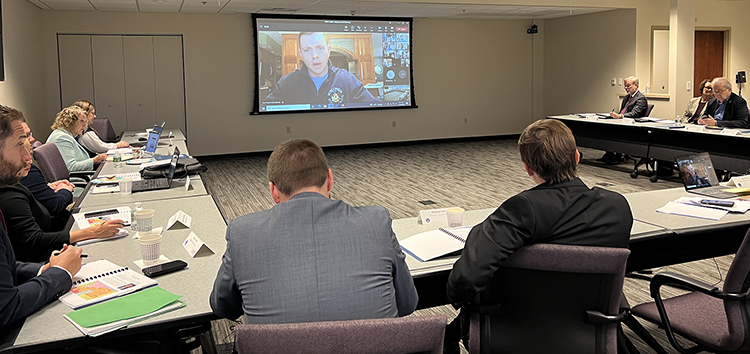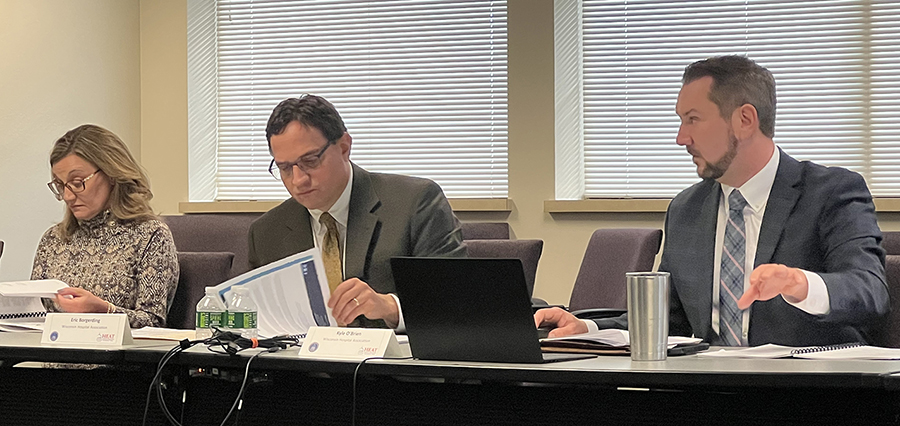Workforce, rising costs of labor and supplies and discharge challenges—issues top of mind for WHA members—were all discussed with Wisconsin State Sen. Patrick Testin (R-Stevens Point), sitting chair of the Senate Health Committee and president pro tempore of the Senate, following remarks he made as a guest speaker during the Nov. 30, 2022, meeting of WHA’s Public Policy Council.
 Wisconsin State Sen. Patrick Testin (R-Stevens Point) speaks virtually to WHA's Public Policy Council during their Nov. 30 meeting.
Wisconsin State Sen. Patrick Testin (R-Stevens Point) speaks virtually to WHA's Public Policy Council during their Nov. 30 meeting.
“WHA has been a tremendous resource and advocate on your behalf,” said Testin. “Working with WHA, we’ve been able to find some common ground and pass legislation to help hospitals, even with split government.”
Testin was the lead author of legislation in the last legislative session that adopted WHA-developed licensure reforms for health care providers practicing in other states to come to Wisconsin and begin practicing immediately.
“We can provide flexibilities to hospitals, like we did with the Act 10 licensing process, while maintaining access to high-quality care. This was the biggest silver lining that we’ve had from the pandemic, and it established a strong base and platform to build upon,” said Testin, referencing WHA’s recommendations to deal with licensure problems through the Legislative Council Study Committee on Occupational Licensure. “Some of the reforms in proposed bills like Act 10 are going to pave the way for us going to this next session.”
Testin asked Council members about their experiences managing patients ready for discharge while they have no post-acute care provider to be discharged to.
Director of Governance and Public Policy at Froedtert Health Bethany Seeboth said Froedtert currently has 54 patients in house waiting for placement to a post-acute care setting.
Chief Nurse Executive at UW Health Rudy Jackson responded, “We are all dealing with this.” Jackson said discharge challenges back up hospital emergency departments and that there is plenty of research that shows mortality increases for patients who are in the emergency department for greater than four hours. “There are bottlenecks everywhere and we need to find a better solution.”
The problem of discharging patients is impacting both urban and rural hospitals.
“We had a Medicaid patient who we were unable to discharge for 100 days,” said Black River Memorial Hospital President & CEO Carl Selvick.
Testin also asked how these discharge challenges are impacting the hospital’s workforce.
 WHA's Senior Vice President Government Relations Kyle O'Brien describes the work WHA's advocacy and public policy team is doing to address guardianship delays impacting patient discharge to post-acute care facilities.
WHA's Senior Vice President Government Relations Kyle O'Brien describes the work WHA's advocacy and public policy team is doing to address guardianship delays impacting patient discharge to post-acute care facilities.
“It’s impacting everyone, but particularly our support staff,” said Selvick.
Director of State and Local Government Relations for Children’s Wisconsin Jodi Bloch said the inability to discharge pediatric patients takes staff and resources away from patients who really need them.
President and CEO of Edgerton Hospital and Health Services Marc Augsburger said policymakers should look to rural hospital swing-bed programs to assist with Medicaid patients when hospitals cannot find a post-acute care placement. Currently, Medicaid’s payment policies would require a rural critical access hospital to take on substantial losses compared to the cost of caring for these patients.
Chief Clinical Officer at SSM Wisconsin Mark Thompson, MD, said discharging patients to post-acute care settings remains a constant challenge. “Any patient that requires two-person assists in a skilled nursing facility is taking 7 to 14 days longer to discharge out of the hospital,” said Dr. Thompson.
WHA President and CEO Eric Borgerding discussed what lawmakers have done to invest in skilled nursing facility care in the last two state budgets. Borgerding also referenced a recent announcement by Gov. Tony Evers that will get skilled nursing facility reimbursement rates for Medicaid patients up to 90% of the nursing home’s cost of caring for patients. This is a substantial increase over what general medical surgical hospitals are paid to care for Medicaid patients at roughly 65% of their costs. Borgerding said that future resources for post-acute care providers need to be targeted to help with hospital discharge challenges that are clearly not going away.
Besides opening new post-acute care capacity, WHA staff described advocacy work being done by the association with state lawmakers to streamline Wisconsin’s guardianship process in the courts.
Vice President and Chief Nursing Officer of Beloit Health System Sharon Cox said that guardianship delays have exacerbated discharge problems for patients. “We’ve had five patients that were here more than 30 days due to guardianship delays. It is a major problem for us.”